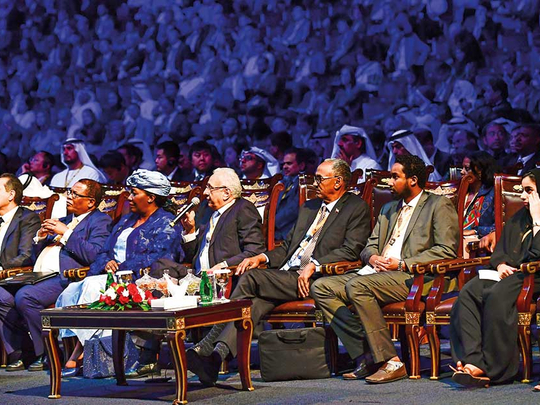
Dubai: As China and the United States ratchet up tensions in their tit-for-tat trade war, a number of senior trade officials urged for calm on Monday.
Speaking at the Annual Investment Meeting (AIM) in Dubai, Paulo Portas, who is deputy chairman of the Portuguese Chamber of Commerce, sought to remind visitors that in reality, things were not quite as bad as they seemed.
“Global trade is much better in reality than in perception at the moment,” Portas said, pointing to increased trade volumes and gross value.
Trade had grown significantly from 2016 to 2018, he added.
- Paulo Portas | Deputy chairman of the Portuguese Chamber of Commerce
Portas warned against putting too much stock in US President Donald Trump’s increasingly bellicose rhetoric on Twitter, saying “things seem worse if we just go on Twitter rhetoric.”
Another factor contributing to the gloomy outlook for global trade is the UK’s decision to leave the European Union.
Portas warned against comparing the Brexit vote and Donald Trump’s administration too closely, however.
“Trump and Brexit are not the same thing. Brexit is not protectionist. Pay attention. One thing is the nationalism of the UK. But they were never protectionist,” he said.
The other thing is American protectionism, Portas added, which has been present in American policy for “decades and decades.”
These comments were echoed by Alistair Long, director of trade and investment at the UK’s Department of International Trade.
“We are certainly not trying to become protectionist,” Long said. “We’re actually trying to become the champion of free trade by the time we leave the EU.”
Despite this distinction, the rise of nationalism as an opposing force to globalisation does appear to threaten global trade, officials said.
Not as much, however, as technology will disrupt manufacturing and traditional industries, Portas added.
“You can pause globalisation, but you can’t stop innovation,” he said.
On his greatest concerns for international trade, Portas said that much of his analysis of the US depended on the coming North American Free Trade Agreement (Nafta) talks.
The agreement has been renegotiated 11 times already. This would be the 12th time.
“The real threat to American foreign trade policy will be Nafta,” he said.
“We’ll know in some weeks if Nafta finally will be renegotiated, or if it will fall. If Nafta falls, I think we should be very worried with the substance of America’s foreign trade policy,” Portas said.
But, he added, if the agreement ended up being renegotiated, as most analysts expect, then Portas says that he “wouldn’t be too worried,” and won’t “pay too much attention to tweets.”
Last Thursday, Trump said that Canada, Mexico, and the US were working “very hard” on the deal, and that they expected to produce “something ... fairly soon.”
Meanwhile, according to Bloomberg, JPMorgan Chase & Co chief executive officer Jamie Dimon said last week that the US had legitimate grievances with China on trade, but that “anything that starts to resemble a trade war” would pour risk and uncertainty into the global economic system.
As unease increases between the two nations, triggered by Trump’s move to slap tariffs on Chinese goods, Dimon said in a letter to shareholders that the US should set a specific timeline for talks, explain what it hopes to achieve, and stay engaged with both China and allies to avoid the worst outcomes.
Resolution of “serious trade issues” would be good for the US and the rest of the world, Dimon wrote, according to Bloomberg.
The dispute with China has wobbled markets. Dimon said last month that he opposes the tariffs because “it opens a whole Pandora’s box of additional problems” including the possibility of damage to US growth and investment.












